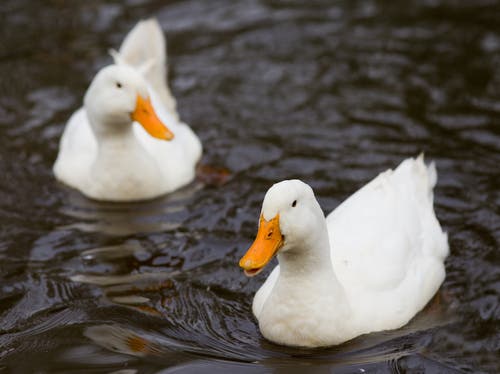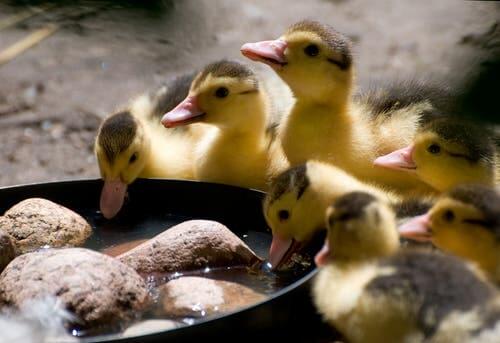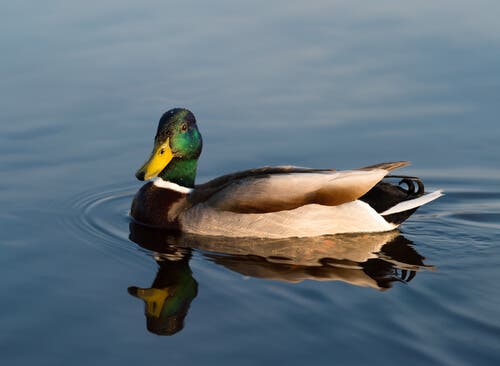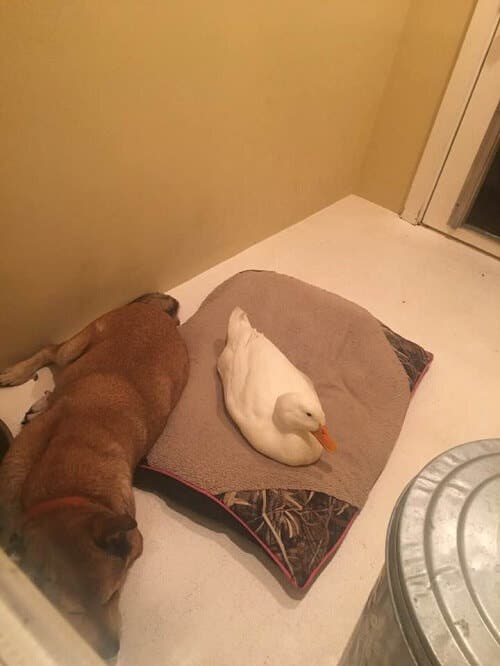What Pet Ducks Need


Written and verified by the lawyer Francisco María García
Knowing what pet ducks need is essential if you want them to be healthy. These birds need specific care with their food, hygiene, and habitat.
Ducks: physical and behavioral characteristics
The term ‘duck’ generally refers to different species of birds belonging to the Anatidae family. Among the most well-known are swans, geese, pochards, and mergansers.
They typically have round bodies, short, webbed feet, and flat, wide beaks. Their life expectancy is about 10 to 15 years, but varies by species, habitat, and medical care.
These birds are perfectly adapted to aquatic life and are excellent swimmers. In the water, they’re incredibly elegant, and exhibit a safe and serene behavior. But they’re quite awkward walkers, thanks to their clumsy feet.

Ducks are also highly sociable and cooperative. In the wild, they usually live in large groups or pairs. Because they’re docile and like to live together, they’re now a very popular pet among both adults and children.
What pet ducks need: a balanced diet
Ducks are omnivores that maintain a varied diet in their natural habitat. Almost 80% of their diet consists of vegetables, fruits, grains, seeds, and assorted legumes.
They also get their fair share of animal protein, since they also eat small fish and insects. An adult consumes between 5 and 7 ounces of food a day, depending on its species, sex, and age.
A domestic duck needs a balanced diet, not fattening. Therefore, it’s best to avoid commercial feed for farm ducks. Providing them with these products favors encourages obesity and many diseases associated with obesity.

A natural diet based on fresh foods is recommended. It may be necessary to add supplements and vitamins to their diet that help strengthen their immune system. But always seek advice from a specialist vet before changing your duck’s diet.
Reinforced hydration
For your duck to grow healthy they need a constant supply of fresh, clean water. It’s just as important to clean their food and water bowls daily to avoid contamination.
What pet ducks need: an ideal environment
It’s fashionable to raise a duck as a pet in big city apartments. As an animal native to fields and farms, this type of housing isn’t ideal for their development. However, their ability to adapt and the dedication of their owner can provide them with a happy life.
Ideally, they need an outdoor space, with a water fountain like a lake, a pool, etc. Ducks enjoy swimming and cleaning themselves daily, as well as needing to walk freely and exercise their muscles very often.

For their shelter and protection, it’s recommended to buy a rabbit hutch or hen house. The size you choose depends on how many ducks and how much space you have.
What pet ducks need: hygiene
Ducks are naturally clean and can easily get sick in a poor hygiene environment. In the wild, they tend to take care of their own body and nests daily. It’s not uncommon for them to spend hours cleaning themselves and their homes.
In this sense, hygiene is one of the most important needs of pet ducks. You should clean their shelters once or twice a week and clean their food and water bowls daily. You can also buy diapers for domestic ducks, to prevent them from defecating in your home.
Socialization
First of all, wild ducks prefer to live in groups, as they’re very sociable animals. They also tend to spend a lot of time searching for and storing food.

At night, they gather to sleep together with their entire group. They’re very empathetic and mourn the loss of one of their members.
When adopting a duck as a pet, you should provide them with moments of coexistence and socialization. These animals need companionship and affection to live and develop healthily. Therefore, the cognitive and emotional stimulation of your new pet should not be neglected.
Preventive medicine
Ducks are often very resistant when fed a balanced diet and maintain optimal conditions for their development. However, they need preventive medicine and regular visits to a specialized vet.
Knowing what pet ducks need is essential if you want them to be healthy. These birds need specific care with their food, hygiene, and habitat.
Ducks: physical and behavioral characteristics
The term ‘duck’ generally refers to different species of birds belonging to the Anatidae family. Among the most well-known are swans, geese, pochards, and mergansers.
They typically have round bodies, short, webbed feet, and flat, wide beaks. Their life expectancy is about 10 to 15 years, but varies by species, habitat, and medical care.
These birds are perfectly adapted to aquatic life and are excellent swimmers. In the water, they’re incredibly elegant, and exhibit a safe and serene behavior. But they’re quite awkward walkers, thanks to their clumsy feet.

Ducks are also highly sociable and cooperative. In the wild, they usually live in large groups or pairs. Because they’re docile and like to live together, they’re now a very popular pet among both adults and children.
What pet ducks need: a balanced diet
Ducks are omnivores that maintain a varied diet in their natural habitat. Almost 80% of their diet consists of vegetables, fruits, grains, seeds, and assorted legumes.
They also get their fair share of animal protein, since they also eat small fish and insects. An adult consumes between 5 and 7 ounces of food a day, depending on its species, sex, and age.
A domestic duck needs a balanced diet, not fattening. Therefore, it’s best to avoid commercial feed for farm ducks. Providing them with these products favors encourages obesity and many diseases associated with obesity.

A natural diet based on fresh foods is recommended. It may be necessary to add supplements and vitamins to their diet that help strengthen their immune system. But always seek advice from a specialist vet before changing your duck’s diet.
Reinforced hydration
For your duck to grow healthy they need a constant supply of fresh, clean water. It’s just as important to clean their food and water bowls daily to avoid contamination.
What pet ducks need: an ideal environment
It’s fashionable to raise a duck as a pet in big city apartments. As an animal native to fields and farms, this type of housing isn’t ideal for their development. However, their ability to adapt and the dedication of their owner can provide them with a happy life.
Ideally, they need an outdoor space, with a water fountain like a lake, a pool, etc. Ducks enjoy swimming and cleaning themselves daily, as well as needing to walk freely and exercise their muscles very often.

For their shelter and protection, it’s recommended to buy a rabbit hutch or hen house. The size you choose depends on how many ducks and how much space you have.
What pet ducks need: hygiene
Ducks are naturally clean and can easily get sick in a poor hygiene environment. In the wild, they tend to take care of their own body and nests daily. It’s not uncommon for them to spend hours cleaning themselves and their homes.
In this sense, hygiene is one of the most important needs of pet ducks. You should clean their shelters once or twice a week and clean their food and water bowls daily. You can also buy diapers for domestic ducks, to prevent them from defecating in your home.
Socialization
First of all, wild ducks prefer to live in groups, as they’re very sociable animals. They also tend to spend a lot of time searching for and storing food.

At night, they gather to sleep together with their entire group. They’re very empathetic and mourn the loss of one of their members.
When adopting a duck as a pet, you should provide them with moments of coexistence and socialization. These animals need companionship and affection to live and develop healthily. Therefore, the cognitive and emotional stimulation of your new pet should not be neglected.
Preventive medicine
Ducks are often very resistant when fed a balanced diet and maintain optimal conditions for their development. However, they need preventive medicine and regular visits to a specialized vet.
This text is provided for informational purposes only and does not replace consultation with a professional. If in doubt, consult your specialist.








